
What is zinc?
Zinc is a mineral that’s responsible for everything from your immune system to wound healing. In fact, taking in enough zinc on a regular basis is important because the body doesn’t store extra, according to the National Institutes of Health (NIH). Here’s everything you need to know about zinc and how to make sure you get enough of this important mineral.

Delayed or stunted growth
Some signs of zinc deficiency include not meeting certain growth standards and dysfunctions in the immune system, according to New York-based allergist Boyan Hadjiev, MD, who is certified in internal medicine and allergy and immunology. He says studies following adolescent athletes, particularly gymnasts, have played a factor in understanding zinc deficiencies. “A combination of increased sweat loss with a decreased intake of certain foods” is something to look out for among athletes, says Dr. Hadjiev, as these actions can contribute to zinc deficiency. High-zinc foods include seafood like oysters, lobster, and crab; beef, chicken, and pork; nuts like cashews and almonds; and legumes such as chickpeas and kidney beans. (Here are some other clues you aren’t getting enough vitamins.)

Irritability
Low energy and depression, as well as conditions such as ADD and ADHD, have also been linked to zinc deficiencies, according to Dr. Hadjiev. He says on average men and women should not consume more than 40 milligrams on zinc per day, but dosages vary based on age and whether you are pregnant or breastfeeding. Lisa Moskovitz, RD, CDN, CPT, stresses a balanced diet to avoid a zinc deficiency. “A balanced diet, including plenty of vegetables, fresh fruits, whole grains, lean proteins, and healthy fats, is the ticket for nourishing your body and maintaining proper health,” she says.
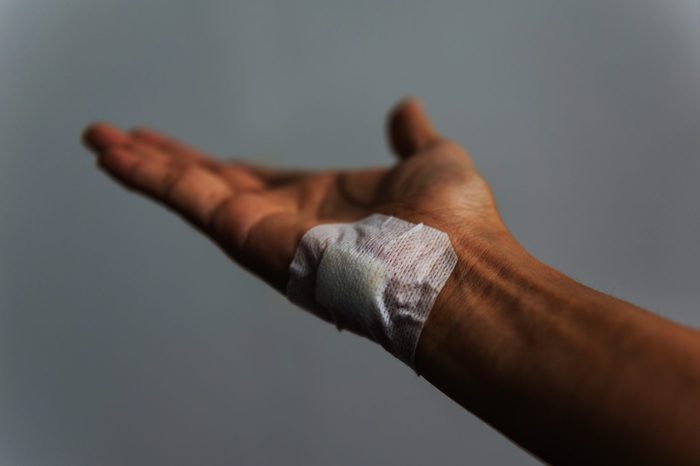
Slow wound healing
Zinc, considered an “essential trace element,” plays many diverse roles in how the body functions. Slow wound healing is one potential sign of a zinc deficiency. “A patient doesn’t walk into the door and say ‘I have a zinc deficiency,’” Dr. Hadjiev says. “You sort of have to figure it out. It’s subtle findings. There are so many different body systems that can be involved, so you have to be suspicious.” (Check out the strangest human body facts.)
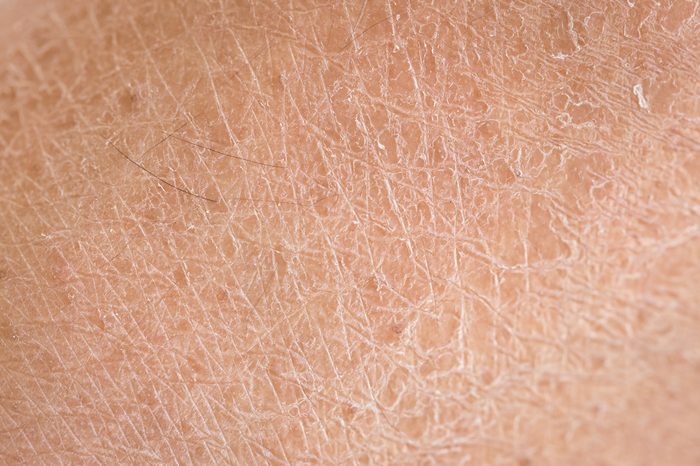
Rough and dry skin
Experiencing skin conditions may also be a sign of zinc deficiency, particularly rashes. Moskovitz says if there are any suspicions you may be zinc deficient, you should consult with a primary care physician. Most of the symptoms of zinc deficiency are similar to other conditions. “The list of findings is very generalized. You can have abdominal pain, loss of hair, loss of appetite, delayed wound healing,” Dr. Hadjiev says. “You can be depressed, you can have eczema or dermatitis, especially if it’s around the mouth or the anus.”
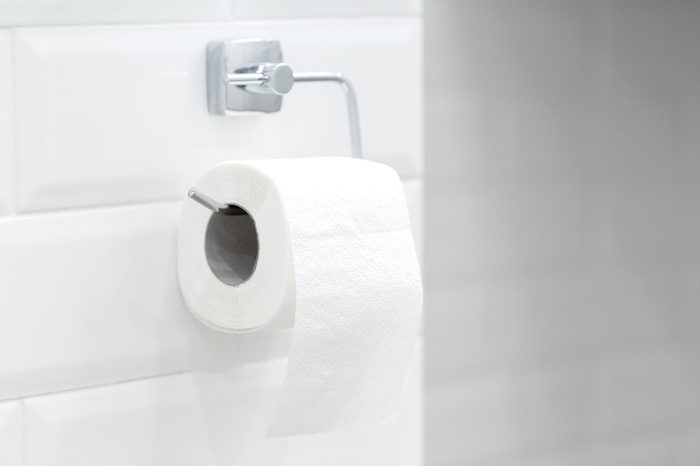
Diarrhea
“You can have diarrhea, which is a very common finding. It’s the most common finding,” Dr. Hadjiev says. While symptoms vary for everyone, Moskovitz says that typically with a zinc deficiency, “you would experience the symptoms more often and continuously versus a sudden attack of nausea or diarrhea.” (Psst: These are the most natural home remedies for diarrhea.)
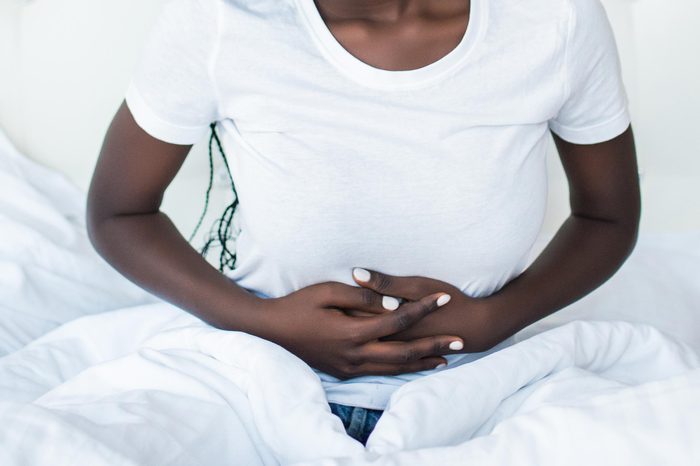
Nausea
While nausea may be a symptom of a zinc deficiency, it may also be a sign of too much zinc as well. Overdoses would most likely occur from a zinc supplementation, Dr. Hadjiev says. “If you eat a ton of oysters, every day, it is possible. You need to take a lot of darn oysters. It would be difficult to exceed [recommended zinc levels] on just food.” Moskovitz agrees that it is rare to experience zinc toxicity on food alone, but warns of greater dangers than nausea and diarrhea, noting severe damage can be done to the stomach lining, and there is the risk of developing anemia. (Worried that you might be anemic? Here’s what test to get done.)
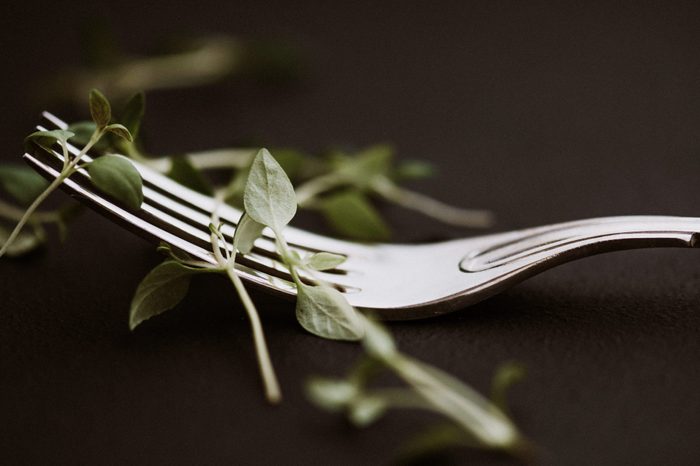
Appetite loss
Appetite loss can also come with impairments of smell and taste when you are not getting enough zinc. “You can have symptoms that mimic anorexia,” Dr. Hadjiev says. “You can have symptoms that affect your mental function, including how you learn and how you perceive pleasure.” Hadjiev notes nervousness and difficulties concentrating as additional symptoms.
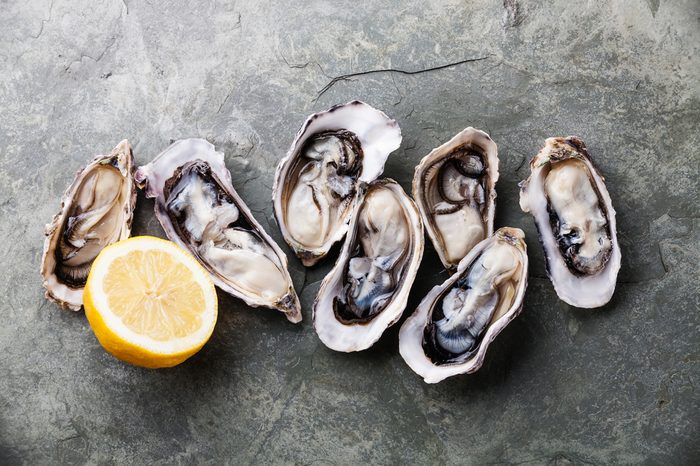
Some of the tastiest foods are also rich in zinc
Zinc-rich foods include oysters, beef, lamb, pumpkin seeds, nuts, chicken, beans, and cocoa products. Zinc is also added to many breakfast cereals. Moskovitz reminds us that the most important factor to consider is that all nutrients are best consumed through diet first. “This ensures your body is getting balanced, sufficient nutrition.” However, people who follow strict vegan diets or have food allergies or severe gastrointestinal disorders may benefit from a supplement to prevent zinc deficiency. Moskovitz says if you are considering taking supplements it is always best to consult with a primary care doctor first, in order to avoid unhealthy or unwanted side effects.
Next, check out the signs you’re not getting enough vitamin D.
